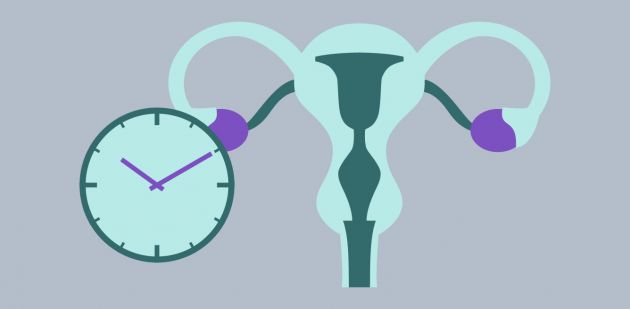Premature ovarian insufficiency affects 1% of women under the age of 40. If left untreated, this condition greatly increases the risk of developing osteoporosis or certain cardiovascular diseases. Not to mention fertility problems.

For about two years, Anne* has been having hot flushes. At night, she often wakes up in a sweat. She can go months without having a period. If this life sciences engineer were 51 years old, the average age of menopause in Switzerland, her symptoms would not surprise anyone. But Anne is barely 40.
It is estimated that 1% of women under the age of 40 end up with early menopause. “These days, specialists call it premature ovarian insufficiency, or POI,” says Nicolas Vulliemoz, head of fertility medicine and gynaecological endocrinology at Lausanne University Hospital (CHUV). POI affects about one woman in 1,000 before the age of 30 and one in 10,000 before the age of 20. This condition is clinically defined mainly as a cessation of menses for more than four months.
“The classic case that we see in consultation is the patient who has stopped taking birth control pills because, for example, she wants to get pregnant. Then she experiences hot flushes and only has sporadic periods, or sometimes not at all,” the doctor says. But Anne has never taken the pill. “I’ve had very irregular menstrual cycles all my life, so I was only concerned when I started having hot flushes and I stopped menstruating completely for several months.”
Premature ovarian insufficiency has two main consequences. “The first obviously concerns their fertility,” Nicolas Vulliemoz says. Only an estimated 3% to 5% of patients with POI get pregnant naturally. The second problem caused by early menopause is low oestrogen levels. “Reduced oestrogen increases the risk of developing osteoporosis or certain cardiovascular diseases.”
The main aim of patient care is to avoid these complications. This involves hormone replacement therapy or a contraceptive pill containing progesterone and oestrogen. “One challenge we face is convincing asymptomatic patients – because they exist as well – to take this treatment,” the expert says. Anne is one of the patients who wouldn’t have minded taking hormones. “But as a health professional, I know the risks of ovarian fatigue, as my gynaecologist calls it.”
One potential cause of POI is certain genetic defects, such as Turner syndrome or autoimmune problems. It is often associated with other conditions such as Graves’ disease or type 1 diabetes. Radiotherapy and chemotherapy can also lead to ovarian insufficiency. “In this case, it’s worth discussing fertility preservation options, primarily ovarian stimulation with cryopreservation of mature oocytes,” the CHUV expert says. Survival rates for fertilised oocytes have increased significantly since the recent discovery of rapid freezing methods, or vitrification.
In more than eight out of ten cases, the causes of early menopause remain unknown. “You simply can’t prepare for it,” Nicolas Vulliemoz says. “The diagnosis is heart-wrenching, because it affects women in the innermost part of their very being. What’s worse is these patients’ hormones are already off balance, and you’re left with situations that can be extremely painful emotionally. That’s why counselling is so important. Solène* confirms, “I was 25 when I found out I had POI. I’d dreamt of starting a family, of having several children since I was a teenager.” The 30-year-old florist remembers when it was announced to her. “I felt like the ground was caving in under my feet.”
Anne had never wanted children, which made it easier for her to take in the diagnosis. However, the young woman did fear the medical repercussions and believes that the main way for people with POI to get the best care is through information. “For now, the subject is taboo, and the terminology in particular can be vague. Early menopause? Premature ovarian insufficiency? Perimenopause? Menopausal transition? Ovarian fatigue?” In her opinion, if women were more aware of this issue, they would have faster access to treatment. /
* Name given to the reporting staff